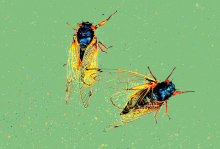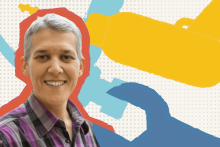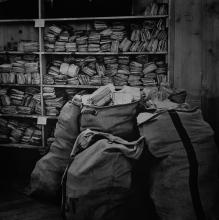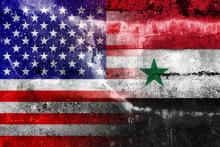quakers

I REJOICED WHEN the cicadas emerged in spring of this year. My family moved to Georgia 13 years ago, missing the periodical cicadas here by a few months. This year, trillions of cicadas from two different broods emerged across 17 U.S. states. It was the first time since 1803 that those broods’ 17- and 13-year cycles were in sync. Some see them as nuisances or pests. I marvel at them. Before this year, I hadn’t heard the distinct song of Magicicada trecidem, a member of the Great Southern Brood whose droning wail prompted worried citizens in South Carolina to call the police on male cicadas for their lovesick racket. Some days I heard the constant blare as a lament for all the wickedness in the world; other times I took it as a call to prayer. Maybe that is what prayer is: bemoaning the horrors and tuning into a God who cares about everything from nations to Magicicada—and listening to a God who cries with us.

“I have friends and family who lost people in the attack by Hamas on Oct. 7. I have colleagues and friends in Gaza who were bombed by the Israeli attack. I go to demonstrations against the genocide in Gaza because I want to be with others that shout and call for the immediate stop of this unforgivable crime. And I cannot chant all the chants in those demonstrations. I chant some of them.”

Unchaining Hope
Thank you for uplifting one of North America’s most prophetic and inspirational persons of our time, Daniel Berrigan, SJ (“The Unchained Life of Daniel Berrigan,” August 2016). He was one of the most hopeful people for change in a time and an era when many of us felt little hope for change in the status quo. I never met him personally but was inspired by both who he was as a person and his commitment to a theology of personal involvement and activism for peacemaking.
John Fogleman
Ontario, Canada
Shame and Blame
Jim Wallis’ analysis of “intersectionality” (“The Categories That Divide Humanity,” July 2016) felt to me like an attack on local, traditional cultures, particularly those that are “white.” As a lifelong rural pastor, I know well the propensity of rural communities toward ethnocentrism. And within the context of American society, all white traditional cultures certainly bear the burden of racism. But the solution is not to dismantle all local, traditional cultures, but to fashion communities that value their heritage along with the heritage of all other cultures. Wallis’ shame-and-blame language not only fails to effect positive change in local, traditional cultures but also may well be the kind of “politically correct” discourse that drives traditional “whites” to embrace political demagogues.
S. Roy Kaufman
Freeman, South Dakota

Two weeks ago, it seemed that any minute the United States would begin bombing Syria. On Aug. 27, NBC’s top headline ran: “Military Strikes on Syria ‘as Early as Thursday,’ U.S. officials say.”
So our Quaker lobby did what all of us peace and security groups do when our country’s decision makers decide to bomb another country and we have long odds and little hope of success from stopping them: we flooded our network — including many of the inboxes of readers of this blog — with pleas to join us in writing, calling, and lobbying members of Congress and the Obama administration to stop this new war.
The pressure worked to postpone U.S. war plans. The groundswell of grassroots opposition to this war persuaded President Obama to go to Congress before launching Tomahawk cruise missiles into Damascus. A vote was expected in days, and then it was delayed, as an unprecedented outpouring of public opposition from Americans of every political stripe pushed Congress to pursue alternatives to military force.
On Jan. 25, 2011, Jacob Flowers left work early to get to a meeting. The organization where Flowers serves as executive director, Mid-South Peace and Justice Center, has been involved in community organizing since 1982. Although not officially affiliated with any religious body, the Center works closely with the faith community and is housed in a large building owned by First Congregational Church, a United Church of Christ community in Memphis.
While a snowstorm swirled outside, Mid-South’s organizing director, Brad Watkins, presided over an afternoon workshop in which anyone who was interested could come in and complete Freedom of Information Act requests about FBI surveillance. Activists decided that a FOIA-themed workshop would be a good way to stand in solidarity with anti-war and pro-Palestinian activists in the Midwest whose homes had been raided by the FBI the year before. Since the workshop attracted only a modest crowd of peace activists, nothing could have been more alarming than the arrival of three unexpected guests—black-clad agents from the FBI’s Joint Terrorism Task Force.
“We suspected that they found a way to get into the building,” Flowers recalled in an interview, “because normally the building is locked up pretty tight.” The FBI agents explained that they were there to warn the owners of the property of an impending protest. Watkins informed them that it was a workshop, not a protest, and that they were currently looking at the people responsible for organizing it. As soon as Watkins began asking if they were trying to harass citizens concerned about FBI repression, the agents quickly left.
Flowers returned to Mid-South’s offices around 3 p.m. to discover nearly a dozen police vehicles on the block surrounding the church and patrolling First Congregational’s parking lot. He also noticed that a black SUV with tinted windows was idling across the street from the church—one of five such vehicles on the scene. Phone calls to the Memphis Police Department (MPD) determined that the department had learned of a planned protest and had sent officers to “keep the peace.” Someone at the local FBI office told Flowers that the only FBI agents on the scene that day had been the three who entered the offices.
A Quaker community in North Carolina reaches out to its Muslim neighbors.
As I stated in an earlier blog post, the juxtaposition of reading Philip Gulley's book http://www.amazon.com/gp/p